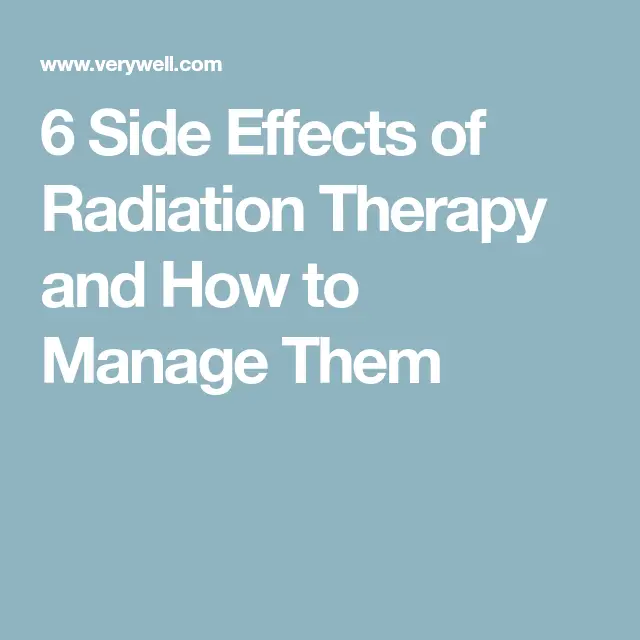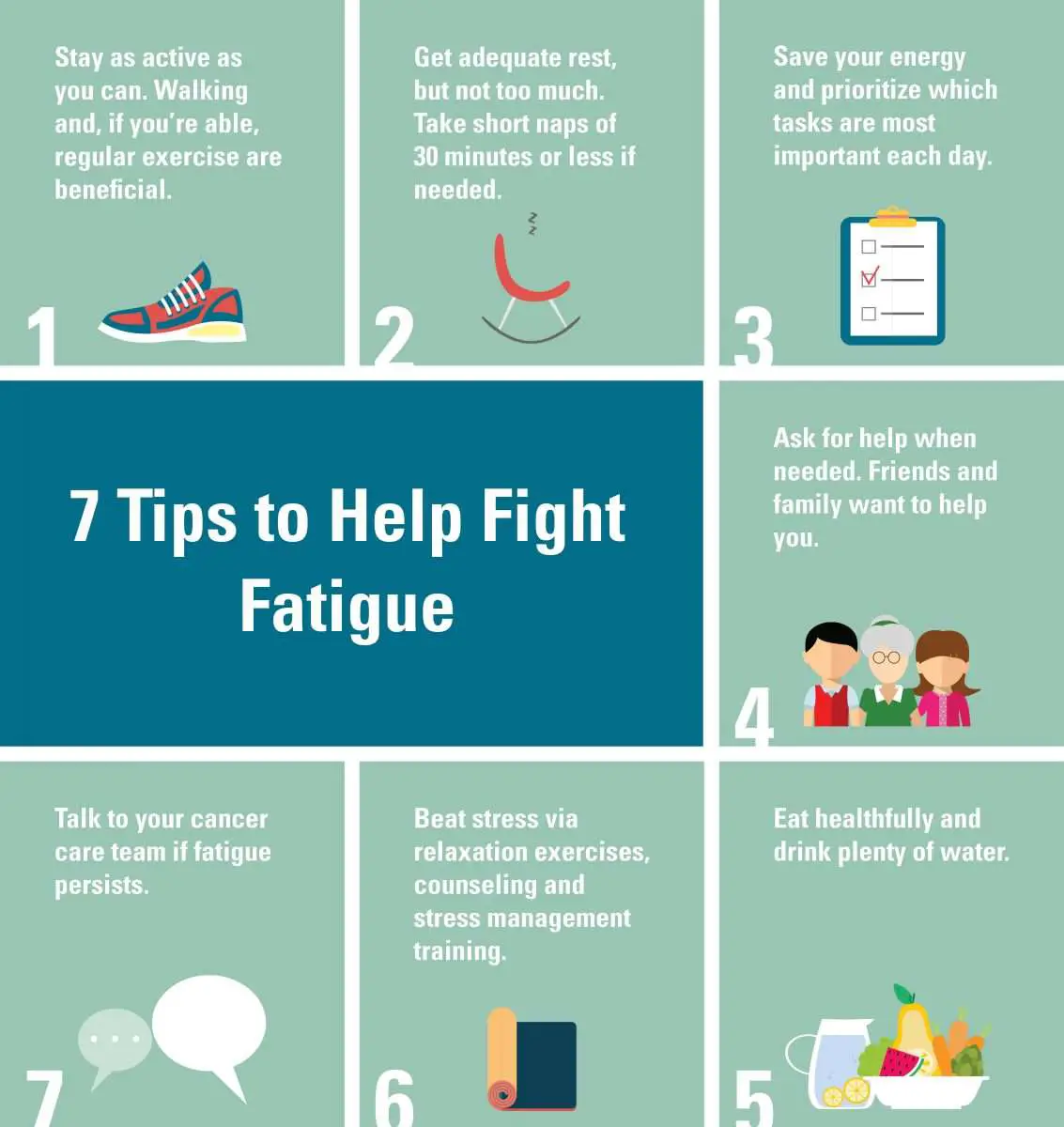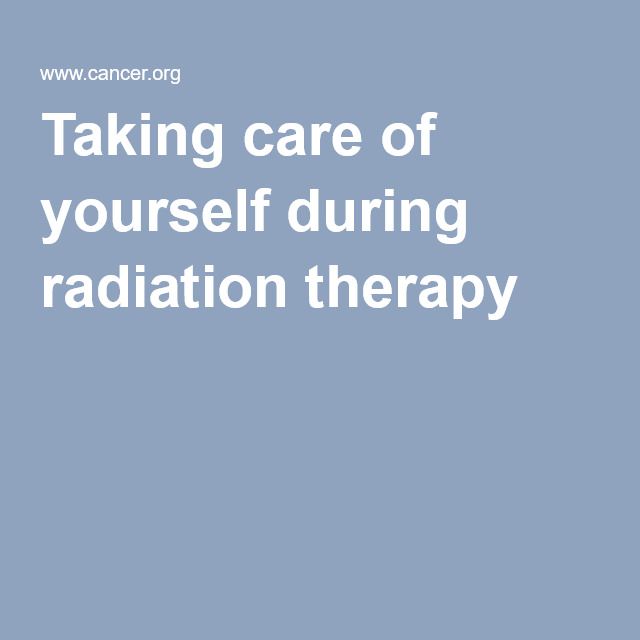About External Beam Radiation Therapy
With external beam radiation therapy, a treatment machine will aim a beam of radiation directly to the tumor from outside your body. The radiation will pass through your body and destroy the cancer cells in its path. You wont see or feel it.
You may be having external beam radiation therapy to 1 or more of the following areas:
- The lymph nodes near your collarbone
- The lymph nodes under your arm
- The lymph nodes near your sternum
Your radiation oncologist and nurse will talk with you about your treatment plan.
Your Healthcare Team Will Continue To Look For Patterns Of Fatigue
A fatigue assessment is repeated to see if there is a pattern for when fatigue starts or becomes worse. The same method of measuring fatigue is used at each assessment. This helps show changes in fatigue over time. The healthcare team will check for other causes of fatigue that can be treated. See the Causes of Cancer Fatigue section.
Also Check: How To Battle Extreme Fatigue
Fatigue And Memory Problems May Be Related
During and after cancer treatment, you may find that you cannot pay attention for very long and have a hard time trying to think, remember, and understand. This is called attention fatigue. Sleephelps to relieve attention fatigue, but sleep may not be enough when the fatigue is related to cancer. Take part in restful activities and spend time outdoors to help relieve attention fatigue.
Recommended Reading: How To Deal With Crohn’s Fatigue
What Is Apbi In Breast Cancer
In select women, some doctors are using accelerated partial breast irradiation to give larger doses over a shorter time to only one part of the breast compared to the entire breast. Since more research is needed to know if these newer methods will have the same long-term results as standard radiation, not all doctors use them. There are several different types of accelerated partial breast irradiation:
Read Also: What Is Adrenal Fatigue Caused By
Why Does Radiation Therapy Cause Fatigue

Fatigue occurs during radiation therapy because the body is working hard to repair the damage caused to healthy cells during treatment. The degree of fatigue generally varies depending on the amount of tissue irradiated, as well as the location.
Radiation therapy may not be the sole culprit of fatigue. Fatigue also is a symptom of cancer itself and the mental stress associated with being a cancer patient. Certain medications, such as those to prevent and treat nausea, can also be responsible for fatigue. It’s not always possible to pinpoint the exact cause because there are many factors in cancer treatment.
Don’t Miss: Swollen Lymph Nodes Joint Pain Fatigue
Skin And Hair Reactions
Your skin and hair in the treatment area will change during your radiation therapy. This is normal.
- Your skin may turn pink, red, tanned, or look like it has sunburn. The skin in the folds under your arm and breast, over your collar bone, and in other parts of the treatment area that have been in the sun may blister and peel.
- Your skin may become very sensitive and itchy.
- You may get a rash, especially in any area where your skin has been in the sun. Tell a member of your radiation therapy team if you get a rash at any time during your radiation therapy. Rashes are sometimes a sign of an infection.
- You may lose some or all of your hair under your arm on the treated side. It usually grows back in 2 to 4 months after you finish radiation therapy.
If your skin becomes open, wet, and oozing, contact your radiation team. They may prescribe a cream called Silvadene® . Your radiation oncologist may also stop your radiation therapy until your skin heals, although this is rarely needed.
Skin reactions from radiation therapy are usually strongest 1 or 2 weeks after you finish radiation therapy and then start to heal. It often takes 3 to 4 weeks for skin reactions to heal. If you have any questions or concerns, dont hesitate to contact your radiation oncologist or nurse.
Skin care guidelines
Follow these guidelines care for your skin during treatment. Keep following them until your skin gets better. These guidelines refer only to the skin in the treatment area.
Cancer Fatigue Is Different From Fatigue That Healthy People Feel
When a healthy person is tired from day-to-day activities, their fatigue can be relieved with sleep and rest. Cancer fatigue is different. People with cancer get tired after less activity than people who do not have cancer. Also, cancer fatigue is not completely relieved by sleep and rest, interferes with daily activities, and may last for a long time. Fatigue usually decreases after cancer treatment ends, but some people may still feel fatigue for months or years.
Also Check: Can Constant Pain Cause Fatigue
When Do You Have Physical Energy
I had my radiation treatments at 2:45 in the afternoon. I quickly discovered that I had more physical energy in the mornings. I would try to prioritize my day to get the most important things done in the morning. If I had lessons that I needed to go over with the boys, it was best that I did it when I had the physical energy to work with them. This was not after my treatments in the afternoon.
If you have your treatment in the morning, your energy cycle might be different. Perhaps you get more physical energy in the evenings. I would encourage you to note the time of day that you feel like you have more energy. Then, plan the most important things when you might feel the best.
Why Does Radiotherapy Make You So Tired
Radiotherapy can cause tiredness because the body is using up your energy reserves to repair healthy cells damaged by the radiotherapy. If you are taking steroids, you might also find that you feel extremely tired when you stop taking them. Travelling to the hospital each day for treatment can also make you tired.
Recommended Reading: Leg Pain Shortness Of Breath Fatigue
Risk Factors And Prevention
Pretreatment fatigue levels have been proposed as an essential risk factor for fatigue development during RT . Diagnosing fatigue and recognizing it as a predictor for this condition during treatment within the first appointments seems to be of uttermost importance. Other factors influencing the grade of severity of RIF that have been described in the literature include the diurnal rhythm, where morning fatigue appears to be more affected by biologic factors and evening fatigue by behavioral factors. Another factor is smoking, with smokers experiencing considerably more fatigue than non-smokers. Time-to-hospitalization appears to influence the grade of severity of RIF, with significantly worse symptoms of fatigue in patients who had to travel 2 or more hours compared to patients who had to travel < 2 h . Factors such as stress, anxiety, depression, a weakened physical condition, diarrhea, malnourishment, and anemia possibly further deteriorate fatigue . Geinitz et al. observed a significant increase in pretreatment fatigue levels compared to posttreatment values. In women with depression and anxiety, fatigue levels were reported to persist for more than 2 years after the termination of RT. Contrary to that, disease staging and neoadjuvant chemotherapy did not impact the severity of fatigue in a study performed by Lavdaniti et al. .
Exercise Has A Positive Effect On Fatigue During And After Cancer Treatment
Exercise may help people with cancer feel better and have more energy during and after treatment. The effect of exercise on fatigue in people with cancer is being studied. One study reported that breast cancersurvivors who took part in enjoyable physical activity had less fatigue and pain and were better able to take part in daily activities. In clinical trials, some people with cancer reported the following benefits from exercise:
- More physical energy.
- More enjoyment with life.
- A greater sense of well-being.
Moderate activity for 3 to 5 hours a week may help cancer fatigue. You are more likely to follow an exercise plan if you choose a type of exercise that you enjoy. Your healthcare team can help you plan the best time and place for exercise and how often to exercise. You may need to start with light activity for short periods of time and build up to more exercise little by little. Studies have shown that exercise can be safely done during and after cancer treatment.
Mind and body exercises such as qigong, tai chi, and yoga may help relieve fatigue. These exercises combine activities like movement, stretching, balance, and controlled breathing with spiritual activity such as meditation.
Cognitive behavior therapy
- A pattern of sleep and activity that changes from day to day.
Other ways to manage fatigue
Don’t Miss: Extreme Fatigue And Low Blood Pressure
If Youre Getting Radiation Therapy To The Head Or Neck
People who get radiation to the head and neck might have side effects such as:
- Soreness in the mouth or throat
How to care for your mouth during treatment
If you get radiation therapy to the head or neck, you need to take good care of your teeth, gums, mouth, and throat. Here are some tips that may help you manage mouth problems:
- Avoid spicy and rough foods, such as raw vegetables, dry crackers, and nuts.
- Dont eat or drink very hot or very cold foods or beverages.
- Dont smoke, chew tobacco, or drink alcohol these can make mouth sores worse.
- Stay away from sugary snacks.
- Ask your cancer care team to recommend a good mouthwash. The alcohol in some mouthwashes can dry and irritate mouth tissues.
- Rinse your mouth with warm salt and soda water every 1 to 2 hours as needed.
- Sip cool drinks often throughout the day.
- Eat sugar-free candy or chew gum to help keep your mouth moist.
- Moisten food with gravies and sauces to make it easier to eat.
- Ask your cancer care team about medicines to help treat mouth sores and control pain while eating.
If these measures are not enough, ask your cancer care team for advice. Mouth dryness may be a problem even after treatment is over. If so, talk to your team about what you can do.
How to care for your teeth during treatment
Radiation treatment to your head and neck can increase your chances of getting cavities. This is especially true if you have dry mouth as a result of treatment.
Early And Late Effects Of Radiation Therapy

- Early side effects happen during or shortly after treatment. These side effects tend to be short-term, mild, and treatable. Theyre usually gone within a few weeks after treatment ends. The most common early side effects are fatigue and skin changes. Other early side effects usually are related to the area being treated, such as hair loss and mouth problems when radiation treatment is given to this area.
- Late side effects can take months or even years to develop. They can occur in any normal tissue in the body that has received radiation. The risk of late side effects depends on the area treated as well as the radiation dose that was used. Careful treatment planning can help avoid serious long-term side effects. Its always best to talk to your radiation oncologist about the risk of long-term side effects.
You May Like: Chronic Fatigue Syndrome Stress Management
Fatigue Prior To Treatment
Several studies have now shown that women with breast cancer complain of fatigue even before the start of treatment.5,36 Ancoli-Israel et al.5 found that women diagnosed with breast cancer had increased fatigue, disturbed sleep, and increased daily dysfunction before the start of chemotherapy, and that those patients with fatigue, poor sleep, and depression pre-chemotherapy experienced more fatigue and poor quality of life during chemotherapy than women with fewer pre-treatment symptoms.37 These data suggest that fatigue is not just a result of radiation or chemotherapy, but rather is multifactorial.
What Reduces The Severity Of Tiredness
The level of tiredness a person experiences relates closely to other activities during treatment. What a person eats, how much they sleep, their level of pain and mental stress affect the body and result in fatigue. Those with a cancer diagnosis and receiving treatment, including radiotherapy, should follow the advice of their board-certified radiation therapy oncologist to combat fatigue. Some common methods for reducing fatigue include:
Recommended Reading: Does Post Stroke Fatigue Ever Go Away
How Long Does It Take For Radiation To Cause Side Effects
Late side effects can take months or even years to develop. They can occur in any normal tissue in the body that has received radiation. The risk of late side effects depends on the area treated as well as the radiation dose that was used. Careful treatment planning can help avoid serious long-term side effects.
How Can I Manage My Fatigue
Even though your normal response to fatigue will be to rest, its important that you keep moving as much as possible. Research shows that spending long periods in bed or lying down can actually make fatigue worse.
Tips to help manage fatigue:
- Incorporate basic exercise, such as walking, into your day. Exercise, especially in the morning, has been shown to greatly assist in reducing fatigue.
- Eat a healthy diet.
- Keep hydrated by drinking plenty of water.
- Organise practical help at home, such as help with childcare, housework or making meals.
- Give your body time to recover after treatment. Try to work up to your usual level of daily activity rather than stepping straight back into old routines.
- Take time to rest throughout the day between activities, but limiting the length of naps so that you are still able to sleep at night. If you are facing sleepless nights during your breast cancer treatment, BCNA’s Sleepless nights: breast cancer and sleep fact sheet provides more tips and strategies that may be helpful.
- Discuss how you feel with a support group or counsellor. You can find a support group near you on the BCNA website or join BCNAs online network to connect with others affected by breast cancer.
You can also discuss your fatigue with your medical treatment team. They may be able to suggest approaches to help reduce or manage fatigue.
Recommended Reading: 6 Feet Anti Fatigue Kitchen Mats
What Is The Most Common Drug Used For Radiation Therapy
The one most commonly used today is amifostine. This drug may be used in people with head and neck cancer to reduce the mouth problems caused by radiation therapy. Not all doctors agree on how these drugs should be used in radiation therapy. These drugs have their own side effects, too, so be sure you understand what to look for.
What Causes Excessive Tiredness
Itâs tricky because a number of things can bring on fatigue when youre going through prostate cancer treatment.
For example, itâs common to feel quite worn down due to:
-
not having enough sleep or rest
-
eating poorly and not getting the right amount of exercise
-
stress, anxiety or depression
Recommended Reading: Weakness And Fatigue In Arms
Read Also: High Blood Pressure And Fatigue
Inflammation And Immune Response
The individualâs inflammatory response is a main mechanism that is proposed to contribute to the experience of RIF. An increased serum level of IL-6sR was significantly associated with fatigue symptoms in women with stage 0-IIA breast cancer receiving 40 Gy of RT for 15 sessions . Increased serum concentrations of IL6 were significantly associated with fatigue symptoms in individuals with unresectable non-small-cell lung cancer receiving curative conventional external beam RT with concurrent chemotherapy . RIF was significantly associated with serum sTNF-R1and IL-6 levels after controlling for numerous covariates in locally advanced colorectal and esophageal cancer receiving concurrent chemoradiation therapy . Homozygous alleles of IL-6 were associated with higher levels of evening and morning fatigue symptoms among cancer patients before, during, and those actively receiving RT .
Microglial and glial cells in the central nervous system also produce cytokines especially in response to stressful conditions caused by RT . The inflammatory cytokines from these cells are thought to communicate with CNS structures causing fatigue by altering neurotransmission in the CNS through the afferent vagus nerve root . For example, the neurons of the preoptic nucleus that synthesize IL-1ò have processes that have ramifications for other CNS structures, including the limbic system and the brainstem causing modulation of the neural response leading to significant fatigue .
How To Get Rid Of Fatigue From Breast Cancer

Get Good Nutrition. Get Exercise. Take Charge of Your Stress. When to Call Your Doctor. More. Youre likely to have some fatigue while youre being treated for breast cancer or any other kind of cancer. Its one of the most common side effects of the disease and of the treatments for it. Fatigue isnt the same as being tired.
Recommended Reading: What Helps With Ms Fatigue